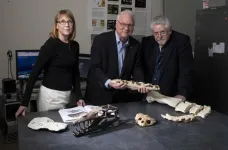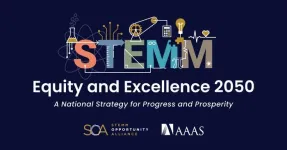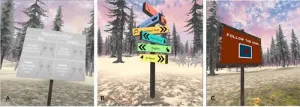(Press-News.org) A University of Queensland researcher has found molecular doorways that could be used to help deliver drugs into the brain to treat neurological disorders.
Dr Rosemary Cater from UQ’s Institute for Molecular Bioscience led a team which discovered that an essential nutrient called choline is transported into the brain by a protein called FLVCR2.
“Choline is a vitamin-like nutrient that is essential for many important functions in the body, particularly for brain development,” Dr Cater said.
“We need to consume 400-500 mg of choline per day to support cell regeneration, gene expression regulation, and for sending signals between neurons.”
Dr Cater said that until now, little was known about how dietary choline travels past the layer of specialised cells that separates the blood from the brain.
“This blood-brain barrier prevents molecules in the blood that are toxic to the brain from entering,” she said.
“The brain still needs to absorb nutrients from the blood, so the barrier contains specialised cellular machines – called transporters – that allow specific nutrients such as glucose, omega-3 fatty acids and choline to enter.
“While this barrier is an important line of defence, it presents a challenge for designing drugs to treat neurological disorders.”
Dr Cater was able to show that choline sits in a cavity of FLVCR2 as it travels across the blood-brain barrier and is kept in place by a cage of protein residues.
“We used high-powered cryo-electron microscopes to see exactly how choline binds to FLVCR2,” she said.
“This is critical information for understanding how to design drugs that mimic choline so that they can be transported by FLVCR2 to reach their site of action within the brain.
“These findings will inform the future design of drugs for diseases such as Alzheimer’s and stroke.”
The research also highlights the importance of eating choline-rich foods – such as eggs, vegetables, meat, nuts and beans.
The research is published in Nature and funded by the National Institutes of Health.
Dr Cater joined UQ in 2024 on an Australian Research Council Discovery Early Career Researcher Award. She performed most of this research in the lab of Professor Filippo Mancia at Columbia University in New York, and worked in close collaboration with the lab of Associate Professor Thomas Arnold from the University of California San Francisco.
Media contact: IMB Communications, communications@imb.uq.edu.au, +61 457 576 843
END
Nutrient research reveals pathway for treating brain disorders
Researchers have found how dietary choline travels through the blood-brain barrier - a discovery that could be used to help deliver drugs into the brain to treat neurological disorders.
2024-05-01
ELSE PRESS RELEASES FROM THIS DATE:
Nationwide, 6 stroke advocates selected to receive 2024 Stroke Hero Awards
2024-05-01
DALLAS, May 1, 2024 — Each year, approximately 800,000 people in the U.S. have a stroke.[1] Six local stroke heroes from across the country are being recognized by the American Stroke Association, a division of the American Heart Association, for their resiliency and dedication in the fight against stroke.
The American Stroke Association’s annual Stroke Hero Awards honors stroke survivors, health care professionals, advocates and caregivers. During May, American Stroke Month, the Association, ...
Sleep resets brain connections – but only for first few hours
2024-05-01
During sleep, the brain weakens the new connections between neurons that had been forged while awake – but only during the first half of a night’s sleep, according to a new study in fish by UCL scientists.
The researchers say their findings, published in Nature, provide insight into the role of sleep, but still leave an open question around what function the latter half of a night’s sleep serves.
The researchers say the study supports the Synaptic Homeostasis Hypothesis, a key theory on the purpose of sleep which proposes that sleeping acts as a reset for the brain.
Lead author Professor Jason Rihel (UCL Cell & Developmental Biology) said: “When we are awake, ...
Rock solid evidence: Angola geology reveals prehistoric split between South America and Africa
2024-05-01
DALLAS (SMU) – An SMU-led research team has found that ancient rocks and fossils from long-extinct marine reptiles in Angola clearly show a key part of Earth’s past – the splitting of South America and Africa and the subsequent formation of the South Atlantic Ocean.
With their easily visualized “jigsaw-puzzle fit,” it has long been known that the western coast of Africa and the eastern coast of South America once nestled together in the supercontinent Gondwana — which broke off from the larger landmass of Pangea.
The research team says the southern coast of Angola, where they dug up the samples, arguably provides the most complete ...
Life expectancy in two disadvantaged areas higher than expected
2024-05-01
Better than expected life expectancy in two disadvantaged areas in England is probably due to population change according to local residents and professionals.
In the UK, people from the most disadvantaged areas can expect to die nine years earlier compared with people from the least disadvantaged areas while people in the north of England have lower life expectancy, higher infant mortality and worse health and wellbeing compared with national averages.
The study, funded by the NIHR School for Public Health Research, was a collaboration between Lancaster University, ...
Dynamic DNA structures and the formation of memory
2024-05-01
An international collaborative research team, including scientists from UQ’s Queensland Brain Institute (QBI), has discovered a novel mechanism underlying memory involving rapid changes in a specific DNA structure.
The team found that G-quadraplex DNA (G4-DNA) accumulates in neurons and dynamically controls the activation and repression of genes underlying long-term memory formation.
In addition, using advanced CRISPR-based gene editing technology, the team revealed the causal mechanism underlying the regulation ...
STEMM Opportunity Alliance releases national strategy at White House summit to diversify and expand STEMM workforce by 2050
2024-05-01
WASHINGTON, D.C. – Today, the STEMM Opportunity Alliance (SOA) announced STEMM Equity and Excellence 2050: A National Strategy for Progress and Prosperity at the 2024 White House Summit on STEMM Equity and Excellence, co-hosted by the White House Office of Science and Technology Policy (OSTP). The overarching goal of the national strategy is to help 20 million people from historically excluded and marginalized communities enter, contribute to, and thrive in Science, Technology, Engineering, Mathematics and Medical (STEMM) fields.
SOA ...
Calcium can protect potato plants from bacterial wilt
2024-05-01
Washington, D.C.—Scientists have discovered that calcium plays a significant role in enhancing the resistance of potato plants to bacterial wilt. This disease causes worldwide losses of potatoes costing $19 billion per year. The findings open up new avenues for integrated disease management strategies, including the potential for calcium amendments to soil as a part of a comprehensive approach to controlling bacterial wilt in potatoes. The study is published in Applied and Environmental Microbiology, a journal of the American Society for Microbiology.
Ralstonia solanacearum species complex (RSSC) is a phytopathogenic bacterial group that causes bacterial wilt in ...
Virtual reality environment for teens may offer an accessible, affordable way to reduce stress
2024-05-01
Social media. The climate crisis. Political polarization. The tumult of a pandemic and online learning. Teens today are dealing with unprecedented stressors, and over the past decade their mental health has been in sustained decline. Levels of anxiety and depression rose after the onset of the COVID-19 pandemic. Compounding the problem is a shortage of mental health providers — for every 100,000 children in the U.S., there are only 14 child and adolescent psychiatrists.
In response to this crisis, University of Washington researchers studied whether virtual reality might help reduce stress ...
Join us in honoring the 2024 American Gastroenterological Association Recognition Awards recipients
2024-05-01
Bethesda, MD (May 1, 2024) — The American Gastroenterological Association (AGA) has announced the 2024 recipients of its annual recognition prizes, given in honor of outstanding contributions and achievements in gastroenterology.
"AGA is delighted to present the recipients chosen for the 2024 AGA Recognition Prizes. We extend our gratitude to all the nominators for their submission of nomination letters, and to the diligent selection committee members for their work in identifying these exceptional individuals from ...
Resource-appropriate cancer care, including coexisting health issues of HIV and cancer, to be addressed during meeting in Nairobi
2024-05-01
NAIROBI, KENYA [May 1, 2024] — Local and global experts are meeting in Nairobi, Kenya to update clinical practice guidelines as part of ongoing work with Allied Against Cancer—a collaboration between the National Comprehensive Cancer Network® (NCCN®), African Cancer Coalition (ACC), American Cancer Society (ACS), and Clinton Health Access Initiative (CHAI). The meeting brings together subject matter experts to update NCCN Harmonized Guidelines™ for Sub-Saharan Africa, featuring updates for treating cancer in people with HIV and other important ...
LAST 30 PRESS RELEASES:
Brain cells drive endurance gains after exercise
Same-day hospital discharge is safe in selected patients after TAVI
Why do people living at high altitudes have better glucose control? The answer was in plain sight
Red blood cells soak up sugar at high altitude, protecting against diabetes
A new electrolyte points to stronger, safer batteries
Environment: Atmospheric pollution directly linked to rocket re-entry
Targeted radiation therapy improves quality of life outcomes for patients with multiple brain metastases
Cardiovascular events in women with prior cervical high-grade squamous intraepithelial lesion
Transplantation and employment earnings in kidney transplant recipients
Brain organoids can be trained to solve a goal-directed task
Treatment can protect extremely premature babies from lung disease
Roberto Morandotti wins prestigious Max Born Award for pioneering research in quantum photonics
Scientists map brain's blood pressure control center
Acute coronary events registry provides insights into sex-specific differences
Bar-Ilan University and NVIDIA researchers improve AI’s ability to understand spatial instructions
New single-cell transcriptomic clock reveals intrinsic and systemic T cell aging in COVID-19 and HIV
Smaller fish and changing food webs – even where species numbers stay the same
Missed opportunity to protect pregnant women and newborns: Study shows low vaccination rates among expectant mothers in Norway against COVID-19 and influenza
Emotional memory region of aged brain is sensitive to processed foods
Neighborhood factors may lead to increased COPD-related emergency department visits, hospitalizations
Food insecurity impacts employees’ productivity
Prenatal infection increases risk of heavy drinking later in life
‘The munchies’ are real and could benefit those with no appetite
FAU researchers discover novel bacteria in Florida’s stranded pygmy sperm whales
DEGU debuts with better AI predictions and explanations
‘Giant superatoms’ unlock a new toolbox for quantum computers
Jeonbuk National University researchers explore metal oxide electrodes as a new frontier in electrochemical microplastic detection
Cannabis: What is the profile of adults at low risk of dependence?
Medical and materials innovations of two women engineers recognized by Sony and Nature
Blood test “clocks” predict when Alzheimer’s symptoms will start
[Press-News.org] Nutrient research reveals pathway for treating brain disordersResearchers have found how dietary choline travels through the blood-brain barrier - a discovery that could be used to help deliver drugs into the brain to treat neurological disorders.




